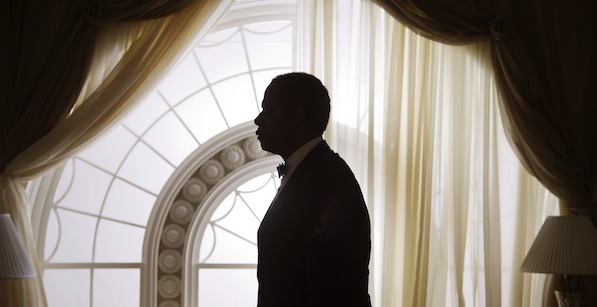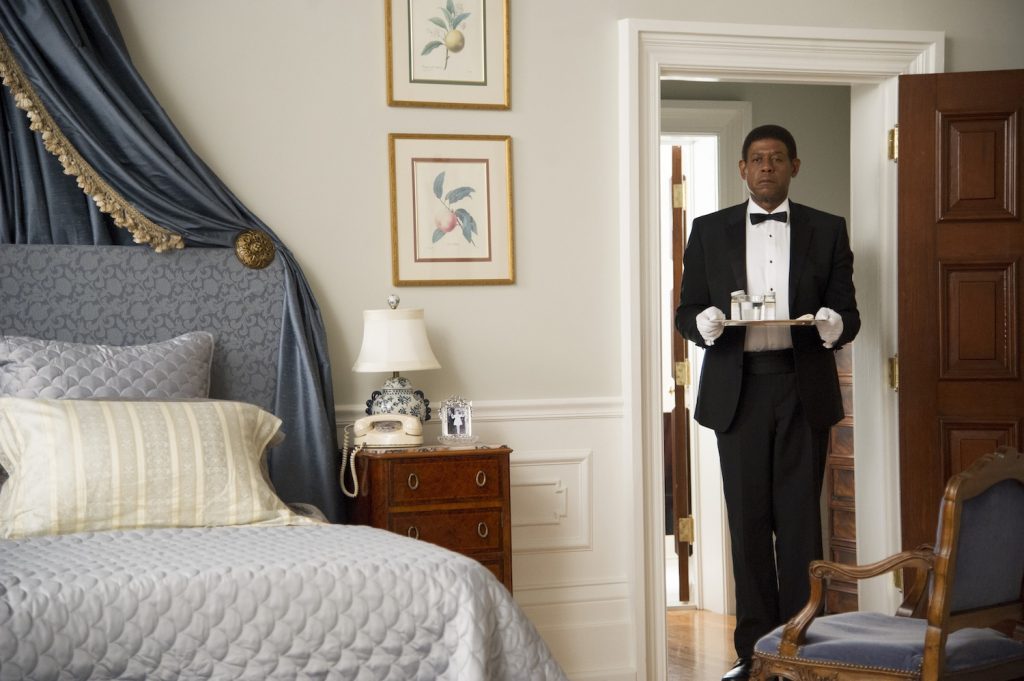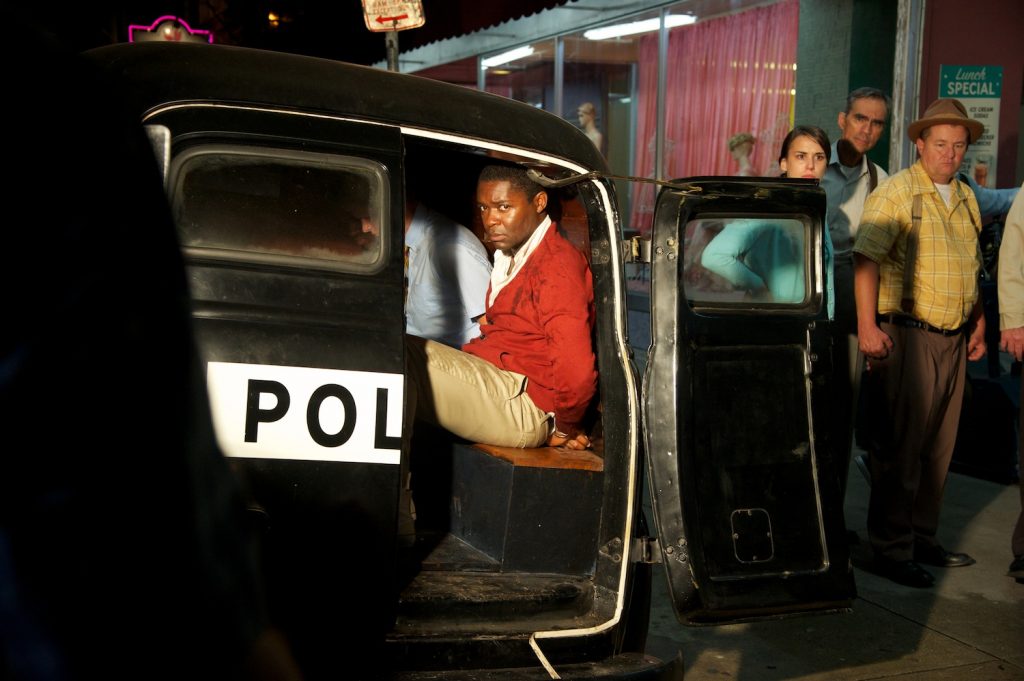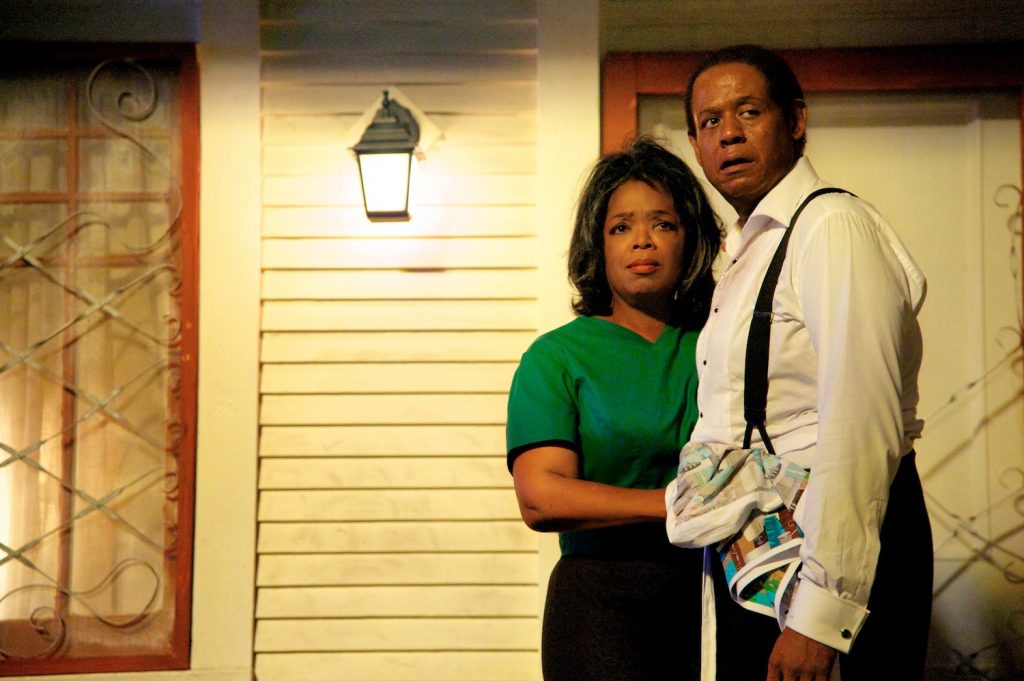When a film is titled Lee Daniels’ The Butler one assumes this possessive moniker indicates widespread public awareness of the man in the director’s chair. But Lee Daniels isn’t Federico Fellini or Alfred Hitchcock or Jean-Luc Godard. He’s not Tyler Perry either—being considerably more talented than that genteel purveyor of blaxploitation. His name is affixed to his film’s title solely in order to placate the MPAA, which insisted can’t be called The Butler because of a comedy short called The Butler made in 1916 that precious few have heard of, much less seen. One doesn’t need a Master’s Degree in Hollywood power politics to recognize that Warner Bros., which owns the 1916 Butler, utilized its legal resources to better to swat Harvey Weinstein, whose company produces and distributes Daniel’s Butler. I seriously doubt any member of the general public will have much interest in this baroque exercise in spite. But—I’m sure to Warner Bros.’ annoyance—it does serve to highlight Daniels’ achievements at a moment when his career is hitting a new high. For rather than an exercise in pop thriller ulra-violence like Shadowboxer (2005), or “realistic” child abuse sensationalism like Precious (2009), or unrestrained all-purpose sensationalism like The Paperboy (2012), Lee Daniels’ The Butler is a dead serious prestige picture about African American history drawn from the real-life experiences a man who was both on the sidelines and in the center of everything, in that he served as the White House butler from the Eisenhower administration right on through to Ronald Reagan’s. Adapted by Danny Strong from an article by Wil Haygood Lee Daniels’ The Butler tells of a man here named Cecil Gaines (beautifully played by Forest Whitaker) and the life he made for himself in the shadow of a national history he participated in at a discreet distance.
While this may bring Forrest Gump to mind, Haines is far from the “mentally challenged” naïf Tom Hanks so memorably played in that specious right-wing extravaganza (in which protesting against the Vietnam war leads to dying of AIDS). Rather he’s a black American everyman trying his best to survive against seemingly insurmountable odds. His difficulties are dramatized with considerable impact at the film’s start, where he and his family are found at work in a southern cotton field one day when The Boss Man (Alex Pettyfer) swans in, casually rapes his mother (Mariah Carey) and when his father, at young Gaines urging, asks about it is just as casually shot in the head. Knowing what it means “not to know your place) Cecil finds one working at chic “white-only” hotels and from there—through no effort of his own—gets to perform similar duties at the White House. He marries and raises a family as history whirls by both close up and far away. Close up he gets to meet and briefly interact with Dwight Eisenhower (Robin Williams) JFK (James Marsden) Lyndon Johnson (Liev Schreiber) Richard Nixon (John Cusack), Ronald Reagan (Alan Rickman) and his wife Nancy (Jane Fonda in a truly marvelous cameo). Cecil never speaks out of turn. Indeed the only protest he ever makes regards the fact that black works at the White House are paid less than whites—a situation that isn’t remedied until Reagan. Meanwhile he has a successful marriage to a very nice woman named Gloria (Oprah Winfrey in an exceptionally lively and unmannered performance); their relative bliss ever so slightly upset by her flirtation with a family friend (Terence Howard) and more seriously troubled by their outspoken son Louis (David Oyelowo) whose involvement in the civil right movement allows the story access to lunch counter sit-ins, “Freedom Rides” and even an interaction with the Black Panthers.
Arriving as it does in the wake of the lynching (is there another word for it?) of Trayvon Martin while media “pundits” assemble like jackals around a dead animal carcass to ponder the “legacy” our first black President will—according to them—leave behind, Lee Daniels’ The Butler is a reminder of the history many ill-recall and few are ever so much as passingly taught. It may, one hopes, open a few eyes. Yet while, as a George Zimmerman juror might put it, “its heart is in the right place,” it’s wise to the ways of Hollywood commerce. After all it has precedent in the TV mini-series Backstairs at the White House (1979) where Leslie Uggams and Louis Gossett Jr. toiled for William Howard Taft straight through to Harry Truman. And in this genre (genteel servant porn) one shouldn’t forget the British mini-series of that same year Upstairs, Downstairs (itself derived from Noel Coward’s Cavalcade) whose current rendition Downton Abbey has given Public Broadcasting a new lease on life. Safely ensconced is the class-bound never-neverland of pre-World War I Great Britain Downton Abby has no racial troubles to roil its well-kept surface. The White House of Lee Daniels’ The Butler is likewise unperturbed. But just outside its well-guarded doors things are changing—a fact made clear by the film’s inevitable last scene where a now-retired Cecil is brought to his former workplace to meet its current boss, Barack Obama. But as we know this “change in management” hasn’t brought the horror Cecil knew as a child to an end. The only difference is his father was shot in the head—and Trayvon Martin in the heart.
Lee Daniels’s heart (one happily returns to metaphor) is clearly beating more assuredly here than it was in The Paperboy—with its “beat all” climactic scene of Nicole Kidman urinating on Zac Ephron to heal a jellyfish bite. Good taste is timeless, and so in this case is good filmmaking.







